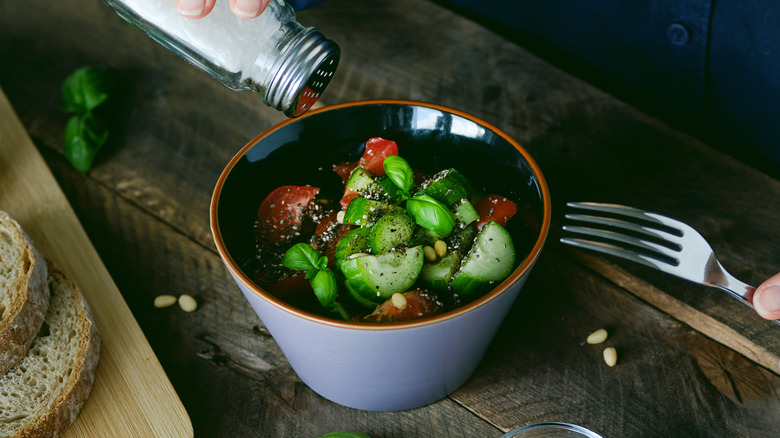Why Cold Food Needs Way More Seasoning Than Hot Food
A complex array of factors contribute to the way we perceive food. Sensory inputs like smell, appearance, and taste all impact the eating experience. Another factor that's also relevant — but often overlooked — is the food's temperature. Cold dishes necessitate more seasoning, all due to how our palate functions.
Temperature has a surprisingly strong effect on the way we perceive flavor. Researchers from Katholieke Universiteit Leuven in Belgium demonstrated that as a foodstuff heats up, our tongue is much more capable of flavor perception. The effect is quite intense: Taking something from lukewarm to hot grows sensitivity by a magnitude in the hundreds. Then, once you hit an extra hot point, the effect tapers off, which is why it's a mistake to eat your food piping hot.
It's no surprise, then, that the practice of strongly flavoring cold dishes is a technique well established among chefs. When describing her favorite chilled soup, for example, Julia Child recommended over-salting to achieve a bold flavor. Keep up with that recommendation to ensure your flavors don't dull.
The tongue senses fewer flavors at low temperatures
The relationship between taste buds and the brain is a complicated one, and still subject to ongoing research. Foods can contain the exact same ingredients, but the diner's perception of them can be completely different if they're served at different temperatures. Why is this? There are a few hypotheses. Some scientists think our predisposition for hot food comes from evolution. Once something is cooked, it's more easily digestible, and nutrients like protein become more available. There's also less chewing involved. Early humans who ate hot food might thus have gained the edge in survival, and lived to pass on their hot food-loving genes. Research also shows that hot food suppresses the appetite for longer.
Beyond all of this, though, is the simple fact that hot food emits more smells into the air. This entices those nearby, and also enhances the food's taste. This isn't to discount the potential of cold dishes, but it must be admitted that they work at a neurological disadvantage. In our brains, hot food means satisfaction.
Seasoning food with salt is crucial
When preparing cold food — say, a bowl of chilled soup, a refreshing noodle dish, or a cool salad — you need to consider how its flavors will be lessened by its temperature. Luckily, this isn't hard to do. Simply add a bit more seasoning than you typically would to compensate for the lower temperature, and make sure to season every step of the way.
Special emphasis should also be placed on salt, a lack of which will hurt your dish. Research published in Nature evinces salt's wondrous nature: It can filter out off-putting bitter notes while still emphasizing sweetness. Salt is also crucial for our health (and that of most animals). Clearly, it's a pretty essential addition to food, but this is especially true when said food is chilled. A good amount of salt ensures bold flavor; it brings every note of sweetness, tanginess, creaminess, and whatever else to the fore. Essentially, if you want your cold food to taste more like itself, add salt.


